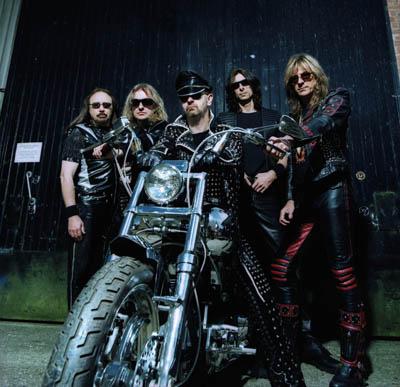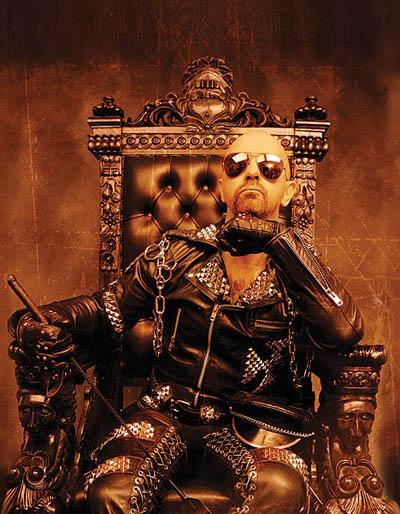
Judas Priest, one of the pioneers of heavy metal.
Judas Priest has been hailed as the godfathers of heavy metal. MTV names the band on its list of greatest metal acts of all time, second only to Black Sabbath and just ahead of Metallica. Both Black Sabbath and Metallica are inductees to the Rock and Roll Hall of Fame, but Judas Priest, for reasons known only to the gods of rock, has so far been left out in the cold.
I told lead vocalist Rob Halford I think the snub has everything to do with his being openly gay.
“I don’t know, let’s have a think; who in there is gay?” Halford says rhetorically. “It’s a good question. I consider myself a lower-case gay, not screaming like my good friend [porn director and drag queen] Chi Chi LaRue. I love all my friends in the community, and if the moment came [for induction into the Hall of Fame], it would be a tremendous moment, not just for the band and our fans, but for the whole LGBT community.”
Halford rose to showbiz fame in the 1970s at the height of the homophobic disco sucks movement. Coming out publicly then would likely have meant career suicide. But Priest’s landmark 1980 album British Steel had more to do with popularizing metal than any other band, including, arguably, Black Sabbath. Priest’s twin lead guitars, pile-driver drums, outlaw lyrics and Halford’s vocals were templates for every band from Iron Maiden to Guns N’ Roses. Judas Priest also codified the metal dress code: long hair, tight pants and leather galore.
As for inventing metal’s leatherman look, Halford says, “It all came from my own imagination because I was never into the gay leather scene.”
He did, however, cross paths briefly with Queen lead singer Freddie Mercury, who died from AIDS 20 years ago this month.
“I was going to Mykonos with friends from London via Athens,” Halford recalls. “We did what we all did then: the clubs, the parties. At one club Freddie was holding court at the other end of the bar. We were two ships passing in the night. He waved, I waved. The place was packed, and we never got a chance to connect.”
Halford says the hard rock/metal scene of 1980s Hollywood was an absolutely insane party, fuelled by drugs and booze.
“In my heyday I always started with a bottle of Dom Pérignon, then a case of Budweiser, then two Jacks,” he says. “I was a serious drinker. Then the lines of coke got you up again. Then the next day there was all the denial. I don’t miss that old routine.”
Halford (who turned 60 this year) quit drinking and drugging in 1986. He not only wanted to live, he wanted to protect his four-octave vocal range.
When I ask him if handsome studs still throw themselves at his feet after all these years, he replies with typical self-deprecation: “It was a drought then and it’s a drought now. ”
After all these years, Halford – who now lives in a modest home in Phoenix, Arizona – hasn’t forgotten his blue-collar roots.
“Coming from Birmingham, like Sabbath, we came from nothing and made something of ourselves,” says Halford, who has subbed for Black Sabbath frontman Ozzy Osbourne at several concerts over the years.
With Judas Priest on its farewell tour, does that mean the end of metal?
“Heavy metal is always going to be there,” Halford says. “At its core, it’s all about a primitive connection we all need to keep in our lives.”


 Why you can trust Xtra
Why you can trust Xtra


